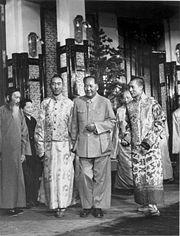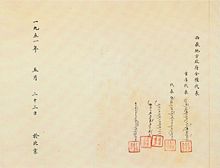
Seventeen Point Agreement for the Peaceful Liberation of Tibet
Encyclopedia
The Agreement of the Central People's Government and the Local Government of Tibet on Measures for the Peaceful Liberation of Tibet, or the Seventeen Point Agreement for the Peaceful Liberation of Tibet for short, is the document by which the delegates of the 14th Dalai Lama
allegedly reached an agreement in 1951 with the government of the newly-established People's Republic of China
on affirming Chinese sovereignty over Tibet
.
Chinese sources regard the document as a legal contract that was mutually welcomed by both governments and by the Tibetan people. Tibetan exile sources and international governments generally consider it invalid, as having been reluctantly or unwillingly signed under duress. The 14th Dalai Lama
has repudiated the agreement on many occasions.
 The People's Liberation Army
The People's Liberation Army
crossed the Jinsha River
on 6 or 7 October 1950 and had defeated the Tibetan army by 19 October. Instead of continuing with the military campaign, China asked Tibet to send representatives to Beijing to negotiate an agreement. The draft agreement was written by China, and Tibetan representatives were not allowed to suggest any alterations. China did not allow the Tibetan representatives to communicate with Lhasa. The Tibetan delegation was not authorized by Lhasa to sign, but ultimately submitted to pressure from the Chinese to sign anyway, using seals which had been specifically made for the purpose.
 Signed and sealed by delegates of the Central People's Government
Signed and sealed by delegates of the Central People's Government
with full powers:
Chief Delegate:
Delegates:
Delegates with full powers of the Local Government of Tibet:
Delegates:
The Tibetan delegates, two officials from Dromo and two from Lhasa
, were chosen by the Dalai Lama to accompany Ngapoi Ngawang Jigme
. According to the Dalai Lama, Ngabo was not empowered to sign any agreement, "only to negotiate".
, who advocated Tibetan acquiescence to China, and sealed in Beijing
on 23 May 1951 and confirmed by the government in Tibet a few months later. In addition, the following letter purportedly written by the Dalai Lama indicating his acceptance was also sent to Beijing in the form of a telegram on the 24th of October. Some say that the delegates were coerced to sign the agreement, others insist that it actually never happened:
According to the Tibetan government-in-exile
, some members of the Tibetan Cabinet (Kashag
), for example, Tibetan Prime Minister Lukhangwa, never accepted the agreement. But the National Assembly of Tibet, "while recognizing the extenuating circumstances under which the delegates had to sign the 'agreement', asked the government to accept the 'agreement'...the Kashag told Zhang Jingwu that it would radio its acceptance of the 'agreement'."
However, Tibetologist Melvyn Goldstein, who interviewed at least two negotiators and the only interpreter (the Dalai Lama's brother-in-law) from the Tibetan side, provides a different account:
And, as a Tibetan negotiator recalled, instances indeed exist when the Tibetan delegates, with Dalai Lama's authorization, were free to suggest alteration.
On the path that was leading him into exile in India, the 14th Dalai Lama
arrived March 26, 1959 at Lhuntse Dzong where he repudiated the "17-point Agreement" as having been "thrust upon Tibetan Government and people by the threat of arms" and reaffirmed his government as the only legitimate representative of Tibet. On the 20th June 1959, at a press conference convened at Mussoorie
, the 14th Dalai Lama
repudiated the agreement once more. He explained that, "since China herself had broken the terms of her own 'Agreement', there could no longer be any legal basis for recognising it."
14th Dalai Lama
The 14th Dalai Lama is the 14th and current Dalai Lama. Dalai Lamas are the most influential figures in the Gelugpa lineage of Tibetan Buddhism, although the 14th has consolidated control over the other lineages in recent years...
allegedly reached an agreement in 1951 with the government of the newly-established People's Republic of China
People's Republic of China
China , officially the People's Republic of China , is the most populous country in the world, with over 1.3 billion citizens. Located in East Asia, the country covers approximately 9.6 million square kilometres...
on affirming Chinese sovereignty over Tibet
Tibet
Tibet is a plateau region in Asia, north-east of the Himalayas. It is the traditional homeland of the Tibetan people as well as some other ethnic groups such as Monpas, Qiang, and Lhobas, and is now also inhabited by considerable numbers of Han and Hui people...
.
Chinese sources regard the document as a legal contract that was mutually welcomed by both governments and by the Tibetan people. Tibetan exile sources and international governments generally consider it invalid, as having been reluctantly or unwillingly signed under duress. The 14th Dalai Lama
14th Dalai Lama
The 14th Dalai Lama is the 14th and current Dalai Lama. Dalai Lamas are the most influential figures in the Gelugpa lineage of Tibetan Buddhism, although the 14th has consolidated control over the other lineages in recent years...
has repudiated the agreement on many occasions.
Lead up

People's Liberation Army
The People's Liberation Army is the unified military organization of all land, sea, strategic missile and air forces of the People's Republic of China. The PLA was established on August 1, 1927 — celebrated annually as "PLA Day" — as the military arm of the Communist Party of China...
crossed the Jinsha River
Jinsha River
Jinsha River is the westernmost of the major headwater streams of the Yangtze River, southwestern China.Its headwaters rise in the Wulan and Kekexili ranges in western Qinghai province, to the south of the Kunlun Mountains, and on the northern slope of the Tanggula Mountains on the border of the...
on 6 or 7 October 1950 and had defeated the Tibetan army by 19 October. Instead of continuing with the military campaign, China asked Tibet to send representatives to Beijing to negotiate an agreement. The draft agreement was written by China, and Tibetan representatives were not allowed to suggest any alterations. China did not allow the Tibetan representatives to communicate with Lhasa. The Tibetan delegation was not authorized by Lhasa to sign, but ultimately submitted to pressure from the Chinese to sign anyway, using seals which had been specifically made for the purpose.
The seventeen points
- The Tibetan people shall unite and drive out imperialist aggressive forces from Tibet; the Tibetan people shall return to the big family of the Motherland the People's Republic of China (PRC).
- The local government of Tibet shall actively assist the PLA to enter Tibet and consolidate the national defences.
- In accordance with the policy towards nationalities laid down in the Common Programme of the Chinese People's Political Consultative Committee, the Tibetan people have the right of exercising national regional autonomy under the unified leadership of the CPG.
- The central authorities will not alter the existing political system in Tibet. The central authorities also will not alter the established status, functions and powers of the Dalai Lama. Officials of various ranks shall hold office as usual.
- The established status, functions and powers of the Panchen Ngoerhtehni shall be maintained.
- By the established status, functions and powers of the Dalai Lama and of the Panchen Ngoerhtehni are meant the status, functions and powers of the thirteenth Dalai Lama and the ninth Panchen Ngoerhtehni when they had friendly and amicable relations with each other.
- The policy of freedom of religious belief laid down in the common programme of the CPPCC shall be carried out. The religious beliefs, customs and habits of the Tibetan people shall be respected and lama monasteries shall be protected. The central authorities will not effect a change in the income of the monasteries.
- Tibetan troops shall be reorganised step by step into the PLA and become a part of the defence force of the PRC.
- The spoken and written language and school education of the Tibetan nationality shall be developed step by step in accordance with the actual conditions in Tibet.
- Tibetan agriculture, livestock raising, industry and commerce shall be developed step by step and the people's livelihood shall be improved step by step in accordance with the actual conditions in Tibet.
- In matters relating to various reforms in Tibet, there will be no compulsion on the part of the central authorities. The local government of Tibet shall carry out reforms of its own accord, and, when the people raise demands for reform, they shall be settled by means of consultation with the leading personnel of Tibet.
- In so far as former pro-imperialists and pro-Kuomintang [Guomindang] officials resolutely sever relations with imperialism and the Kuomintang [Guomindang] and do not engage in sabotage or resistance, they may continue to hold office irrespective of their past.
- The PLA entering Tibet shall abide by all the above-mentioned policies and shall also be fair in all buying and selling and shall not arbitrarily take a needle or thread from the people.
- The CPG shall have centralised handling of all external affairs of the area of Tibet; and there will be peaceful co-existence with neighbouring countries and establishment and development of fair commercial and trading relations with them on the basis of equality, mutual benefit and mutual respect for territory and sovereignty.
- In order to ensure the implementation of this agreement, the CPG shall set up a Military and Administrative Committee and a Military Area HQ in Tibet and - apart from the personnel sent there by the CPG - shall absorb as many local Tibetan personnel as possible to take part in the work. Local Tibetan personnel taking part in the Military and Administrative Committee may include patriotic elements from the local government of Tibet, various districts and various principal monasteries; the name list shall be set forth after consultation between the representatives designated by the CPG and various quarters concerned and shall be submitted to the CPG for appointment.
- Funds needed by the military and Administrative Committee, the Military Area HQ and the PLA entering Tibet shall be provided by the CPG. The local government of Tibet should assist the PLA in the purchase and transport of food, fodder and other daily necessities.
- This agreement shall come into force immediately after signature and seals are affixed to it.
Delegates

Central People's Government
The Central People's Government is the central government of the People's Republic of China in Beijing. According to the 1982 Constitution, "Central People's Government" is synonymous with the State Council.-History:...
with full powers:
Chief Delegate:
- Li Wei-han (Chairman of the Commission of Nationalities Affairs);
Delegates:
- Chang Ching-wu, Chang Kuo-huaZhang GuohuaZhang Guohua was a Chinese general and a politician, serving during the Invasion of Tibet and the Sino-Indian War and later as a Communist Party secretary for the Tibet Autonomous Region.-Biography:...
, Sun Chih-yuan
Delegates with full powers of the Local Government of Tibet:
- Chief Delegate: Ngapoi Ngawang JigmeNgapoi Ngawang JigmeNgapoi Ngawang Jigme was a Tibetan senior official who assumed various military and political responsibilities both before and after 1951. He is often known simply as Ngabo in English sources.-Early life:...
Delegates:
- Dzasak Khemey Sonam Wangdi, Khentrung Thuptan, Tenthar, Khenchung Thuptan Lekmuun Rimshi, Samposey Tenzin Thondup
The Tibetan delegates, two officials from Dromo and two from Lhasa
Lhasa
Lhasa is the administrative capital of the Tibet Autonomous Region in the People's Republic of China and the second most populous city on the Tibetan Plateau, after Xining. At an altitude of , Lhasa is one of the highest cities in the world...
, were chosen by the Dalai Lama to accompany Ngapoi Ngawang Jigme
Ngapoi Ngawang Jigme
Ngapoi Ngawang Jigme was a Tibetan senior official who assumed various military and political responsibilities both before and after 1951. He is often known simply as Ngabo in English sources.-Early life:...
. According to the Dalai Lama, Ngabo was not empowered to sign any agreement, "only to negotiate".
Signing of the Agreement
The agreement was signed by Ngapoi Ngawang JigmeNgapoi Ngawang Jigme
Ngapoi Ngawang Jigme was a Tibetan senior official who assumed various military and political responsibilities both before and after 1951. He is often known simply as Ngabo in English sources.-Early life:...
, who advocated Tibetan acquiescence to China, and sealed in Beijing
Beijing
Beijing , also known as Peking , is the capital of the People's Republic of China and one of the most populous cities in the world, with a population of 19,612,368 as of 2010. The city is the country's political, cultural, and educational center, and home to the headquarters for most of China's...
on 23 May 1951 and confirmed by the government in Tibet a few months later. In addition, the following letter purportedly written by the Dalai Lama indicating his acceptance was also sent to Beijing in the form of a telegram on the 24th of October. Some say that the delegates were coerced to sign the agreement, others insist that it actually never happened:
"The Tibet Local Government as well as the ecclesiastic and secular people unanimously support this agreement, and under the leadership of Chairman Mao and the Central People's Government, will actively support the People's Liberation Army in Tibet to consolidate national defence, drive out imperialist influences from Tibet and safeguard the unification of the territory and the sovereignty of the Motherland."
According to the Tibetan government-in-exile
Central Tibetan Administration
The Central Tibetan Administration , is an organisation based in India with the stated goals of "rehabilitating Tibetan refugees and restoring freedom and happiness in Tibet". It was established by the 14th Dalai Lama in 1959 shortly after his exile from Tibet...
, some members of the Tibetan Cabinet (Kashag
Kashag
The Kashag was the governing council of Tibet during Qing Dynasty and Republic of China. It was set by Qianlong Emperor in 1751. In that year the Tibetan government was reorganized after the riots in Lhasa of the previous year...
), for example, Tibetan Prime Minister Lukhangwa, never accepted the agreement. But the National Assembly of Tibet, "while recognizing the extenuating circumstances under which the delegates had to sign the 'agreement', asked the government to accept the 'agreement'...the Kashag told Zhang Jingwu that it would radio its acceptance of the 'agreement'."
Repudiation of the Agreement
The signing of the Seventeen-Point agreement was later contested as invalid in the Tibetan exile community, who charged that the Tibet delegates were forced to sign under duress and that the Chinese allegedly used forged Tibetan government seals. The exile community and their supporters continue to assert that the Tibetan representatives were not allowed to suggest any alterations and that the Chinese government did not allow the Tibetan representatives to communicate with Lhasa.However, Tibetologist Melvyn Goldstein, who interviewed at least two negotiators and the only interpreter (the Dalai Lama's brother-in-law) from the Tibetan side, provides a different account:
And, as a Tibetan negotiator recalled, instances indeed exist when the Tibetan delegates, with Dalai Lama's authorization, were free to suggest alteration.
On the path that was leading him into exile in India, the 14th Dalai Lama
14th Dalai Lama
The 14th Dalai Lama is the 14th and current Dalai Lama. Dalai Lamas are the most influential figures in the Gelugpa lineage of Tibetan Buddhism, although the 14th has consolidated control over the other lineages in recent years...
arrived March 26, 1959 at Lhuntse Dzong where he repudiated the "17-point Agreement" as having been "thrust upon Tibetan Government and people by the threat of arms" and reaffirmed his government as the only legitimate representative of Tibet. On the 20th June 1959, at a press conference convened at Mussoorie
Mussoorie
Mussoorie is a city and a municipal board in the Dehradun District of the northern Indian state of Uttarakhand. It is located about 35 km from the state capital of Dehradun and 290 km north from the national capital of New Delhi...
, the 14th Dalai Lama
14th Dalai Lama
The 14th Dalai Lama is the 14th and current Dalai Lama. Dalai Lamas are the most influential figures in the Gelugpa lineage of Tibetan Buddhism, although the 14th has consolidated control over the other lineages in recent years...
repudiated the agreement once more. He explained that, "since China herself had broken the terms of her own 'Agreement', there could no longer be any legal basis for recognising it."
See also
- Incorporation of Tibet into the People's Republic of China
- Foreign relations of TibetForeign relations of TibetThe Foreign relations of Tibet are documented from the 7th century onward, when Buddhism was introduced by missionaries from India. The Tibetan Empire sparred with Tang China for control over territory, but relations became good with a peace marriage...
- History of TibetHistory of TibetTibetan history, as it has been recorded, is particularly focused on the history of Buddhism in Tibet. This is partly due to the pivotal role this religion has played in the development of Tibetan, Mongol, and Manchu cultures, and partly because almost all native historians of the country were...
- Tenzin Gyatso, 14th Dalai Lama
External links
- A translation of the full text including preamble of the agreement on tibetjustice.org
- A translation of the full text including preamble of the agreement on china.org
- The Tibetan View of the Seventeen Point Agreement – Central Tibetan Administration
- The Chinese View of the Seventeen Point Agreement – China Tibet Information Center

